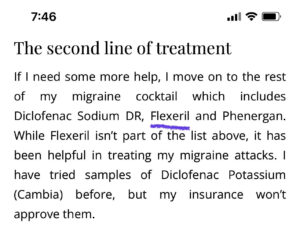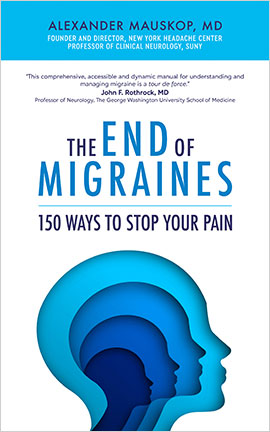If you suffer from migraine headaches, you know how debilitating they can be. Migraine episodes can cause severe pain, sensitivity to light and sound, and nausea just to name a few symptoms. Most people with frequent or chronic migraine have tried many different medications. If you are reading this, you are likely doing a little homework to help you decide if taking muscle relaxers for migraine is for you.
** While Migraine Strong writes about the latest in migraine treatments, this is not medical advice. This topic is solely intended to give you information. We are patient educators and all information you read should be discussed with your doctor.
Where do muscle relaxers fit into migraine care?
One of the most frustrating aspects of trying to kick migraine to the curb is that we often need potent medications. Sometimes these medications don’t get the job done. Other times they work but the side effects are unacceptable so we have to start over.
These medications have a specific and substantial task to do on our brain chemistry so it shouldn’t be surprising that the effects extend beyond what we want them to do – fix the source of the problem.
The often long path of “trying this and that”
Finding the right medication or combination of medications often requires a bit of trial and error. Some medications for migraine prevention take months to assess whether or not they are successful. This can be beyond frustrating if you need to try several medications for months. We all want fast, lasting relief.
Of course there are plenty of natural treatments to try as well as a holistic approach to migraine headaches. Even the process of trying different supplements can get old. Many of us need medications to do the heavy lifting for consistent relief.
First things first
Muscle relaxers can be effective for migraine and usually require weeks rather than months to determine if they are helpful or not. However, they are not what most neurologists reach for first for migraine prevention. Neurologists tend to try beta-blockers, anti-CGRP medications, antidepressants and anti-convulsant drugs before trying muscle relaxers for migraine.
Our practical guide on migraine preventives is an excellent resource for medications in those categories as well as others.
Muscle relaxants can reduce migraine attacks and improve quality of life for those who haven’t had luck with the first, second and third lines of preventive treatments. Additionally, some people cannot take the afore mentioned medications for medical, personal or insurance reasons. Your doctor may choose to put this category of medication at the front of the line for your care plan.
How muscle relaxers for migraine work
First, a few words about the mechanism of migraine. It’s complex. The short video called “What is Migraine” produced by the Association of Migraine Disorders is one of the best that I have seen. Around the one-minute mark, the role of neurotransmitters and the brainstem in migraine are mentioned. This is usually where many migraine medications like muscle relaxers as well as natural interventions play a role.
It is believed that in migraine, combinations of genes negatively alter proper function. Because we all have unique genes and mutations, the reason for migraine as well as what can help prevent and treat attacks varies greatly. Finding the right combination of interventions can be a long process.
The published research about the muscle relaxers
There have been many studies on beta blocker, anti-CGRP meds, seizure medications, etc. for migraine plus a great deal of observational data from migraine experts. There hasn’t been much published research about muscle relaxers for migraine even though there is plenty of experience with them with migraine specialists and pain management doctors. And the studies tend to be older. Don’t let that deter you from considering these medications if that’s what your doctor has in mind.
Muscle relaxers mechanism of action
According to published scientific literature it’s thought that muscle relaxers help migraine in one or more of these 3 ways:
- Altering important neurotransmitters like norepinephrine and serotonin especially in the brain stem and spinal cord.
- Directly blocking pain
- Loosening tight muscle fibers and muscles in spasm
Yes, people with migraine may have tight muscles, but the way the medication may be effective may or may not have anything to do with your aching neck, jaw or shoulders. The relationship between migraine and neck pain may not be what you think. There’s more to neck symptoms and migraine than most people think. Neck pain symptoms are often part of migraine prodrome rather than the trigger.
Muscle relaxers mechanism of action according to social media buzz
Having looked at about a dozen posts inquiring about different muscle relaxers and migraine relief and reviewing 100s of anecdotal experiences with the 3 commonly prescribed muscle relaxers for migraine prevention, the feedback is positive overall.
In my opinion, what should be added to the short list of the “official” ways muscle relaxants work is by inducing sleep.
Sleep is a key part of minimizing migraine
Sleep is often a key part of aborting a migraine. I think most headache specialists will agree about 2 important aspects of sleep. Consistent sleep is also part of a preventive regimen.
1- Sleep is often needed to abort an attack. Sleep seems to allow the nervous system to reset itself. I think most neurologists will prescribe meds and suggest rest or sleep. Some of the magic is likely in how our brain waves and our neurochemistry change while asleep.
2- Many people with frequent and chronic migraine do not get enough quality sleep. It may be an unrecognized part of sleep management. It’s in our Treatment Pie.
Although the only mention of sleep in the research is sleepiness is a “side effect,” it may be a key part of the medications formula for success.
The big 3 – baclofen, tizadine and cyclobenzaprine for migraine
Let’s take a look at the most researched muscle relaxers for migraine. They are often prescribed so there is also a great deal of commentary in social media about them that helps the lay person understand why their doctor may have prescribed these medications.
Baclofen for migraine prevention and nystagmus
An older study published in 1999 showed such positive results from daily baclofen that it prompted some neurologists to give it a try. The study was small but the prescribing trend caught on as clinical observation showing migraine improvement was good.
Also, Baclofen is sometimes prescribed for people with vestibular migraine who have nystagmus, an involuntary, rapid, rhythmic movement of the eye. In this case the drug can do double-duty- it helps prevent migraine episodes from starting as well as treating nystagmus.
Tizadine for chronic daily headache and migraine
A study on tizadine for chronic headache and migraine was conducted in 2000. It was not placebo-controlled but showed very favorable results from taking the medication daily.
In a 2002 study, the effect of daily tizadine for chronic headache and migraine was measured against a group taking a placebo. The study lasted for 8 weeks. After 4 weeks those on the medication showed a significant improvement whether they had a diagnosis of chronic tension-type headache or migraine.
As mentioned earlier, some migraine preventives takes months to be effective. Based on this study, tizadine helped migraine in weeks rather than months. This is a nice advantage.
A prominent headache specialist, Dr. Alexander Mauskop, who wrote the relatively recent book, The End of Migraines: 150 Ways to Stop Your Pain, tends to prescribe tizadine for migraine more often than other types of muscle relaxers. He thinks this class of medication is worth trying for certain patients.
A common brand name for tizadine is Zanaflex.
Cyclobenzaprine (Flexeril) for migraine
1972 was the year Don McLean’s song American Pie hit the music charts. It was also the last time a study was published about cyclobenzaprine and chronic headache. The crossover, placebo-controlled study was small with only 20 participants but the results were very good from daily cyclobenzaprine.
The lack of published studies has not stopped some doctors from using this medication as a migraine treatment. In social media posts, it seems to be prescribed fairly often for people. I suppose it’s possible that the medication is being prescribed for muscle tension with the pleasant “side effect” of helping migraine. However, tizadine, not cyclobenzaprine, seems to be the go-to muscle relaxer for migraine for most prescribing doctors. This is likely due to lack of published research for cyclobenzaprine.
A common brand name for cyclobenzaprine is Flexeril.
Are muscles relaxers migraine preventives or acute treatments?
The published information, including our practical guide, suggests they are useful as preventives. However, some people are prescribed muscles relaxers as needed for migraine attacks. Our own Eileen Zollinger has it as part of her “second line of treatment” in her excellent review of different “migraine cocktails.”

Side effects and other precautions
The most common negative side effect of muscle relaxers in sleepiness. Most often they are prescribed to be taken at night for this reason. Some people may have a hard time feeling functional when they wake up. As with many medications, this side effect may be one that fades over time.
Muscle relaxers are often started at a lower dose and increased gradually. This planned progression may help you get through side effects as well as find the right dose to help your head.
Many of us with migraine are on a variety of other medications for this headache disorder as well as other conditions. Unfortunately, muscle relaxers negatively interact with several medications commonly taken by people living with migraine. So, please raise the issue with a prescribing doctor as well as a trusted pharmacist.
This was mentioned at the top of the article but must be repeated. This is a discussion about the potential for muscle relaxers to help with migraine. It is strictly for informational purposes. Always ask your doctor before changing your migraine treatment plan.


Thank you for this article, I have used muscle relaxer consistently for years as part of my migraine treatment and did not know how it worked. There are a few that I cannot take due to side affects and was thinking about doing without them but will ask doc to see if there is another I can try.